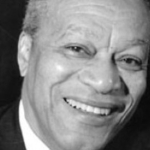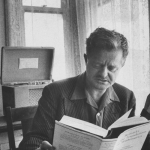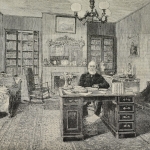All day she stands before her loom;
The flying shuttles come and go:
By grassy fields, and trees in bloom,
She sees the winding river flow:
And fancy’s shuttle flieth wide,
And faster than the waters glide.
Is she entangled in her dreams,
Like that fair-weaver of Shalott,
Who left her mystic mirror’s gleams,
To gaze on light Sir Lancelot?
Her heart, a mirror sadly true,
Brings gloomier visions into view.
“I weave, and weave, the livelong day:
The woof is strong, the warp is good:
I weave, to be my mother’s stay;
I weave, to win my daily food:
But ever as I weave,” saith she,
“The world of women haunteth me.
“The river glides along, one thread
In nature’s mesh, so beautiful!
The stars are woven in; the red
Of sunrise; and the rain-cloud dull.
Each seems a separate wonder wrought;
Each blends with some more wondrous thought.
“So, at the loom of life, we weave
Our separate shreds, that varying fall,
Some strained, some fair: and, passing, leave
To god the gathering up of all,
In that full pattern wherein man
Works blindly out the eternal plan.
“In his vast work, for good or ill,
The undone and the done he blends:
With whatsoever woof we fill,
To our weak hands His might He lends,
And gives the threads beneath His eye
The texture of eternity.
“Wind on, by willow and by pine,
Thou blue, untroubled Merrimack!
Afar, by sunnier streams than thine,
My sisters toil, with foreheads black;
Whereof we gather bounteous fruit.
And those who walk in garments soiled:
Their shame, their sorrow, I endure;
By their defect my hope is foiled:
The blot they bear is on my name;
Who sins, and I am not to blame?
“And how much of your wrong is mine,
dark women slaving at the South?
Of your stolen grapes I quaff the wine;
The bread you starve for fills my mouth:
The beam unwinds, but every thread
With blood of strangled souls is red.
“If this be so, we win and wear
A Nessus-robe of poisoned cloth;
Or weave them shrouds they may not wear,—
Fathers and brothers falling both
On ghastly, death-sown fields, that lie
Beneath the tearless Southern sky.
“Alas! the weft has lost its white.
It grows a hideous tapestry,
That pictures war’s abhorrent sight:—
Unroll not, web of destiny!
Be the dark volume left unread,—
The tale untold,—the curse unsaid!”
So up and down before her loom
She paces on, and to and fro,
Till sunset fills the dusty room,
And makes the water redly glow,
As if the Merrimack’s calm flood
Were changed into a stream of blood.
Too soon fulfilled, and all too true
The words she murmured as she wrought:
But, weary weaver, not to you
Alone was war’s stern message brought:
“Woman!” it knelled from heart to heart,
“Thy sister’s keeper know thou art!”


















Comment form: